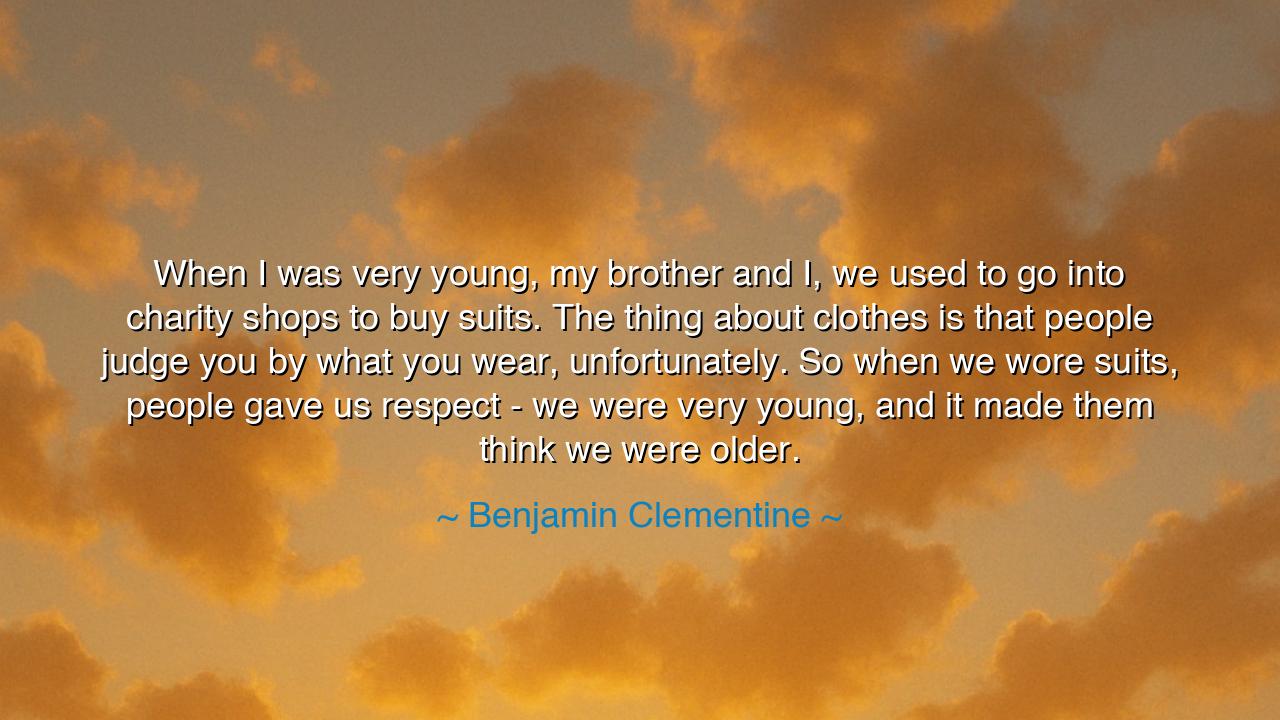
When I was very young, my brother and I, we used to go into
When I was very young, my brother and I, we used to go into charity shops to buy suits. The thing about clothes is that people judge you by what you wear, unfortunately. So when we wore suits, people gave us respect - we were very young, and it made them think we were older.






In the words of Benjamin Clementine, the poet-musician whose voice carries both sorrow and strength, there lies a quiet revelation: “When I was very young, my brother and I, we used to go into charity shops to buy suits. The thing about clothes is that people judge you by what you wear, unfortunately. So when we wore suits, people gave us respect — we were very young, and it made them think we were older.” Beneath this simple memory unfolds a meditation on perception, identity, and the longing for respect in a world that too often mistakes appearances for truth. It is the reflection of a soul that has walked through hardship and learned that the outer form, though fleeting, can shape the way others treat the inner light.
Benjamin Clementine, born into struggle and self-discovery, grew up between two worlds — the one within, rich with imagination and song, and the one without, cold with indifference. In his youth, before fame or recognition, he and his brother would wander into charity shops, searching not for luxury but for dignity. A suit, for them, was not merely fabric stitched with thread; it was armor against judgment, a shield in a society that measured worth by appearance. To wear a suit was to command a moment of grace in the eyes of others — a small victory in a world that too easily dismisses the poor, the young, or the unknown.
Yet, Clementine’s words carry a bittersweet truth. He calls it unfortunate — this human weakness to judge by what we see. For though the suit earned him respect, it also revealed how shallow such respect can be. It was not the boy they honored, but the illusion they perceived. The suit became both empowerment and disguise. In this paradox lies one of life’s oldest lessons: that while appearance can open doors, it is the character beneath the cloth that determines whether we truly belong. The wise learn to use the symbols of respect without being enslaved by them.
History offers many reflections of this truth. Consider the story of Frederick Douglass, the great orator and abolitionist. Born into bondage, denied the garments and freedoms of a free man, Douglass understood how appearance shaped perception. When he escaped slavery, he dressed himself in fine clothes before stepping into the world — not out of vanity, but as a declaration of his humanity. He knew, as Clementine did, that people see what they wish to see, and that sometimes one must clothe oneself in dignity before the world will acknowledge it. His coat became his weapon, his suit his statement: “I am not what you have called me — I am more.”
But both Clementine and Douglass teach us that the outer image is but a tool; it cannot replace the soul’s integrity. To seek respect through appearance is a temporary bridge, not a destination. True respect — the kind that endures beyond the moment — arises not from the cut of a suit, but from the way one walks, speaks, and lives. The clothes may invite attention, but the spirit commands reverence. This is why, even as he acknowledges the power of image, Clementine speaks with a tinge of sadness. He knows that real worth cannot be worn; it must be earned, and those who see only fabric may never perceive the truth of the heart beneath it.
And yet, there is beauty in this story — the beauty of transformation through self-belief. When the young Benjamin put on those suits, he was not only changing how others saw him; he was changing how he saw himself. The suit gave him posture, presence, and purpose. It whispered to him that he was not small, not powerless, but capable of walking with the grace of those who were once his betters. Sometimes, in the early chapters of life, such symbols become stepping stones to inner confidence. What begins as imitation becomes self-realization, until at last, the clothes are no longer needed to command respect — for the spirit has learned to command it on its own.
So, my children, hear this lesson: do not despise the symbols of respect, but do not mistake them for respect itself. Present yourself with dignity, for the world will often judge by sight before it listens by heart. But let your true beauty be the radiance of your conduct, your compassion, and your courage. The suit may gain you attention, but it is character that wins you lasting honor.
For as Benjamin Clementine reminds us, the world may judge by what it sees, but you are not bound by the world’s eyes. Dress not merely the body, but the soul. Wear kindness as your coat, wisdom as your tie, and humility as your crown. And when others see you — whether clothed in silk or in simplicity — let them sense the quiet power of a being who respects himself, and thus, commands the respect of all.






AAdministratorAdministrator
Welcome, honored guests. Please leave a comment, we will respond soon